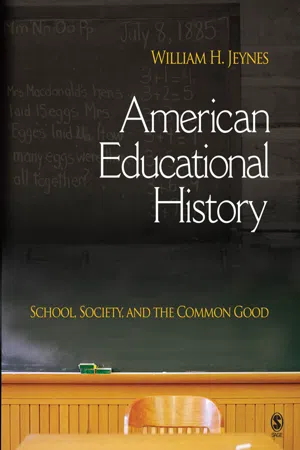History
Political Effects of The Civil War
The Civil War had significant political effects on the United States, including the abolition of slavery with the passage of the 13th Amendment, the expansion of federal power over the states, and the redefinition of the relationship between the federal government and individual states. These changes reshaped the political landscape and set the stage for the Reconstruction era.
Written by Perlego with AI-assistance
Related key terms
1 Key excerpts on "Political Effects of The Civil War"
- eBook - ePub
American Educational History
School, Society, and the Common Good
- William H. Jeynes(Author)
- 2007(Publication Date)
- SAGE Publications, Inc(Publisher)
CHAPTER 7The Effects of Events During and Between the Civil War and World War I
D uring the period from 1861 to 1918, from the Civil War to World War I, the United States matured into a primary economic world power. By 1900, the United States maintained the highest standard of living of any nation in the world, a position it would hold until 1973 (U.S. Department of Labor, 2005). Educators believe that the ascending American education system of the 19th and early 20th centuries contributed measurably to the puissant economy that Americans would enjoy in the 20th century (Hungerford & Wassmer, 2004). Undoubtedly, the period from 1861 to 1918 was an important one in the history of American education. Urbanization, industrialization, and immigration would all have a prominent impact. In addition, schools assumed new social roles that produced some controversy. Educators also debated about what should be the appropriate nature of education for African Americans in the post–Civil War era. This chapter of American educational history also yielded a more well-defined American education system, which in most respects resembled that which the nation’s citizenry is familiar with today.IMPACT OF THE CIVIL WAR
Many historians claim that America did not become a full-fledged nation until the conclusion of the Civil War (Johnson, 1997). There are a number of reasons historians make this assertion.First, slavery had divided the nation prior to the Civil War. In a very real sense, as the slave trade grew, the nation became two nations under one roof (Johnson, 1997). On the basis of this reality, Abraham Lincoln (1858) made a famous speech in which he declared, paraphrasing Jesus in the New Testament, “A house divided against itself cannot stand.” Certainly with such a division tearing the country apart, the United States really could not function as one nation.
Learn about this page
Index pages curate the most relevant extracts from our library of academic textbooks. They’ve been created using an in-house natural language model (NLM), each adding context and meaning to key research topics.
